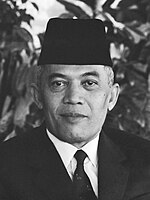Search Results - Nasution, Abdul Haris 1918-
Abdul Haris Nasution
 Abdul Haris Nasution (Old Spelling: Abdoel Haris Nasution; 3 December 1918 – 6 September 2000) was a high-ranking Indonesian general and politician. He served in the military during the Indonesian National Revolution and he remained in the military during the subsequent turmoil of the Parliamentary democracy and Guided Democracy. Following the fall of President Sukarno from power, he became the Speaker of the People's Consultative Assembly under President Suharto. Born into a Batak Muslim family, in the village of Hutapungkut, Dutch East Indies, he studied teaching and enrolled at a military academy in Bandung.
Abdul Haris Nasution (Old Spelling: Abdoel Haris Nasution; 3 December 1918 – 6 September 2000) was a high-ranking Indonesian general and politician. He served in the military during the Indonesian National Revolution and he remained in the military during the subsequent turmoil of the Parliamentary democracy and Guided Democracy. Following the fall of President Sukarno from power, he became the Speaker of the People's Consultative Assembly under President Suharto. Born into a Batak Muslim family, in the village of Hutapungkut, Dutch East Indies, he studied teaching and enrolled at a military academy in Bandung.He became a member of the Royal Netherlands East Indies Army, but following the Japanese invasion, he joined the Defenders of the Homeland. Following the proclamation of independence, he enlisted in the fledgling Indonesian armed forces and fought during the Indonesian National Revolution. In 1946, he was appointed commander of the Siliwangi Division, the guerrilla unit operating in West Java. After the end of the national revolution, he was appointed Chief of Staff of the army, until he was suspended for his involvement in the 17 October affair. He was reappointed to the position in 1955.
In 1965, an attempted coup occurred, later officially blamed on the Communist Party of Indonesia. Nasution's house was attacked, and his daughter was killed, but he managed to escape by scaling a wall and hiding in the Iraqi ambassador's residence. In the following political turmoil, he assisted in the rise of President Suharto and was appointed Speaker of the People's Consultative Assembly. He had a falling-out with Suharto, who saw him as a rival, and he was pushed out of power in 1971. Once he was removed from positions of power, Nasution developed into a political opponent of Suharto's New Order Regime, though he and Suharto began to reconcile in the 1990s. He died on 6 September 2000 in Jakarta, after suffering a stroke and going into a coma. His body was interred at Kalibata Heroes' Cemetery. Provided by Wikipedia